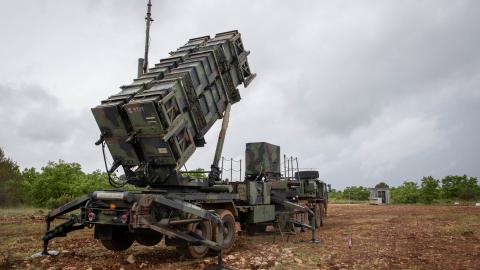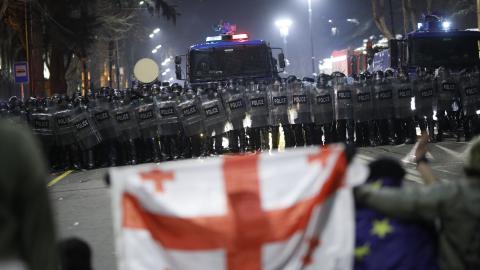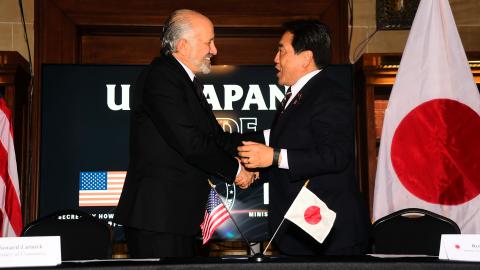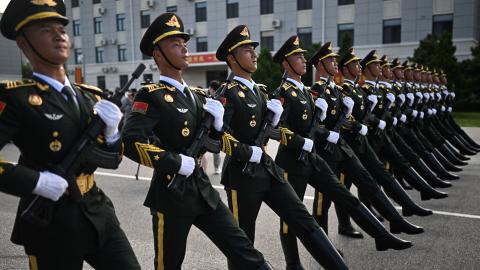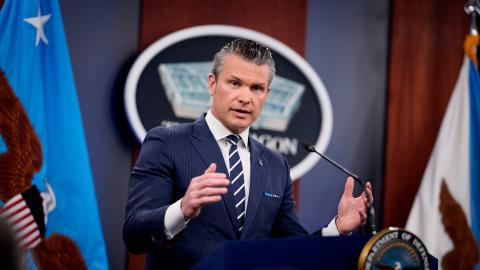Before the Helsinki Commission, Luke Coffey testifies on Russian influence in Georgia, the global consequences of Georgia’s slide into authoritarianism, and the United States’ policy options.
Written Testimony
Chairman Wicker, Co-Chairman Wilson, Ranking Member Whitehouse, Ranking Member Cohen, and distinguished Commissioners, I am honored to speak before your esteemed Commission for the hearing “From Partner to Problem: Georgia’s Anti-American Turn.”
My name is Luke Coffey. I am a senior fellow at Hudson Institute. The views I express in this testimony are my own and should not be construed as representing any official position of Hudson Institute. The last time I had the honor of testifying before the Helsinki Commission on Georgia was in July 2018, during the 10th anniversary of Russia’s invasion that led to the occupation of Abkhazia and the Tskhinvali region (commonly referred to as South Ossetia). Back then, there was still optimism about Georgia’s transatlantic future. While pro-Russian elements existed inside Georgian Dream, there remained enough voices committed to Georgia’s Western path to keep the country moving forward, even if slowly. That sense of optimism stands in stark contrast to where Georgia finds itself today.
Democratic Backslide
It goes without saying that my fellow Georgian witnesses here today can offer a deeper insight into the decision-making and the path that brought us to this point. But from my point of view, as someone who has followed Georgia’s journey closely, the trajectory over the past several years has been deeply troubling and it is worth recapping.
After entering office in 2012, Georgian Dream led a coalition that proved to be a good partner for the West. Even though there were always elements inside Georgian Dream whose sympathies lay with Moscow, they were kept marginalized by the coalition’s Western-oriented mainstream. Over the years, however, the pro-Russian elements of Georgian Dream worked their way to the top while pushingthese Western-oriented members out of government.
The result is a Georgian Dream today that looks nothing like it did in 2012. The party now pursues policies that unfairly marginalize the political opposition. What began as informal crackdowns on civil society, opposition groups, and independent media has now been codified into legislation that pushes Georgia’s once-thriving civic space to the margins of debate. New laws restrict free expression and the right to peaceful protest. Opposition leaders have been jailed through dubious judicial processes. Ahead of last year’s parliamentary elections, the de facto leader of Georgian Dream—and of the country—Bidzina Ivanishvili, threatened opposition figures with “harsh political and legal judgment”. Since then, he has kept true to his word. Across the country, patriotic citizens whose only crime is holding a different political outlook are targeted, harassed, and even jailed. Meanwhile, Georgian Dream remains fixated—almost pathologically obsessed, on punishing former President Mikheil Saakashvili, who remains imprisoned under dubious and politically motivated convictions while suffering visibly deteriorating health. This obsession continues even though Saakashvili and senior members of his United National Movement left office peacefully after losing the 2012 elections more than 13 years ago.
Meanwhile, there has been nothing but support for the Georgian Dream government from Moscow. Outspoken Russian philosopher and Kremlin insider Alexander Dugin declared that “Georgia is on the right track”[8] with the passing for the so-called Russia Law in 2024. Kremlin spokesperson Dmitry Peskov blamed the West for provoking “anti-Russian sentiments” among Georgians. Russian Foreign Minister Sergey Lavrov, too, has publicly defended Georgia’s legislative measures restraining civil society.
Western Path Off Track
There is also the matter of Georgia’s westward journey being curtailed. In October 2012 I wrote:
“Despite vaguely reassuring public utterances, Mr. Ivanishvili is thought to want to slow down, if not halt altogether, Georgia’s integration into Euro-Atlantic structures like the European Union or NATO.”
Sadly, I was right.
While Georgian Dream officials insist that the country’s future lies in the community of Western nations, little is being done to make this a reality. The declaration from last two NATO summits—in 2024 and in the summer of 2025—made no mention of Georgia’s membership prospects or of the country’s importance to the alliance. This was a first since Georgia was promised eventual membership at the Bucharest Summit in 2008. NATO’s recent silence stands in stark contrast to previous summit communiqués, which often devoted entire paragraphs to the importance of the NATO-Georgia relationship. The absence of any reference now should serve as a wake-up call that Georgia NATO aspirations have been derailed.
Meanwhile, last November the government announced it would suspend Georgia’s EU bid until at least 2028. EU membership has long been a unifying national aspiration, with three-quarters of Georgians consistently in favor regardless of political affiliation. For many, the government’s decision felt like a profound betrayal—even among some Georgian Dream supporters—and it has become a central driver of the street protests that continue today.
A Kremlin World View
In recent years, the Georgian Dream government has increasingly embraced a Kremlin-aligned worldview, if not outright pro-Russian policies. In May 2023, then Prime Minister Irakli Garibashvili stated that “NATO enlargement” was one of the main reasons for Russia’s invasion of Ukraine—parroting Kremlin talking points to justify Russia’s attack. The Georgian Dream government also called into question the wisdom of Western sanctions against Moscow. Not only did it refuse to join the sanctions regime, but trade between Russia and Georgia has increased since the invasion of Ukraine. As a result, Georgia has become a gray zone in the global economy through which Russia circumvents international restrictions.
Today, with President Trump seeking a peaceful conclusion to the war—and having already shown a willingness to use economic pressure and tariffs to increase costs on Moscow, as seen recently with India—Georgian Dream’s deepening economic ties with Russia help sustain its aggression against the Ukrainian people. In effect, Georgian Dream’s actions directly undermine President Trump’s ability to broker peace. Put simply, Georgian Dream now stands in the way of the President’s goal of ending the war.
The Georgian Dream has also coined the phrase “Global War Party” to describe those in the United States and Europe who support Ukraine in its fight against Russia’s invasion. Georgian Dream officials have parroted Russian talking points by falsely claiming that American and European officials are pressuring Georgia to open a “second front” against Russia.
This narrative was weaponized in the run-up to the October 2024 national elections. Georgian Dream used it to instill fear among the Georgian people by presenting a false dichotomy: either vote for Georgian Dream to stay in power, or face another Russian invasion. This propaganda campaign was backed by tasteless posters across the country that contrasted images of a devastated Mariupol with a thriving Batumi—suggesting Georgians had to choose between the two.
It is important to set the record straight. I have never heard a U.S. official ever suggest that Georgia should open a “second front” against Russia. In fact, the longstanding policy regarding Georgia’s two occupied regions—based on a non-use-of-force pledge dating back to the days of Mikheil Saakashvili—remains the best policy for Georgia today. Nobody in Washington or Brussels wants Georgia to open a second front against Russia.
Also disturbing has been the treatment of Georgians who chose to fight for Ukraine. Georgia’s State Security Service has accused Mamuka Mamulashvili, commander of the Georgian Legion which has been fighting in Ukraine since Russia’s first invasion in 2014, of plotting to overthrow the government—allegations widely seen as politically motivated. In March 2022, the government blocked a charter flight organized to carry Georgian volunteers to Ukraine, provoking condemnation from Kyiv. Since then, reports have surfaced of Georgian authorities revoking private weapons permits for some volunteers who fought in Ukraine,and last year several returning fighters were summoned by the State Security Service for questioning under serious charges. Together, these actions send a chilling message to those who stand with Ukraine.
I have seen and met with these Georgian men and women in Ukraine. They are heroes who have sacrificed for the freedom of their Ukrainian brothers and sisters. Instead of vilifying them, obstructing their efforts, and targeting their leaders with baseless accusations, the government should be honoring them. These men and women deserve streets named after them and statues raised in their memory—not harassment, smears, and intimidation.
Geo-Political Consequences for The USA
Of course, democratic backsliding in any partner country is troubling. But in Georgia the consequences are especially serious for the U.S. Georgia’s backsliding does not just weaken its own institutions—it undermines U.S. national security interests in the wider Black Sea and across Eurasia. This is precisely why the U.S. should care.
I have already highlighted concerns about Tbilisi’s comfortable relationship with Moscow—particularly in skirting sanctions and shifting blame onto the West for Russia’s invasion of Ukraine—but there are other issues that also affect U.S. national security interests.
The Chinese Communist Party
Georgia’s ties with Beijing have grown steadily in recent years. During a recent visit, Prime Minister Irakli Kobakhidze even described China as "one of the best examples of state modernization," suggesting that it offers a positive model for other global powers.
At a time when many European countries are pushing China out of infrastructure and telecommunications projects, Georgia is moving in the opposite direction. For example, the Anaklia Deep-Water Port project is now led by a Chinese consortium—primarily China Communications Construction Company (CCCC)—which holds a 49 percent stake in the project. This follows the cancellation in 2020 of an earlier U.S.–Georgian consortium. It is worth noting that China Communications Construction Company (CCCC) has been under U.S. sanctions since the first Trump administration. At the time, it was accused of playing a central role in building artificial islands in disputed areas of the South China Sea. Then–U.S. Secretary of State Mike Pompeo stated: “The PRC must not be allowed to use the CCCC and other state-owned enterprises as weapons to impose an expansionist agenda.”
In the telecommunications and digital governance sectors, the trend is equally concerning: an estimated 70 to 80 percent of Georgia’s government institutions use surveillance cameras made by Chinese firms, while Huawei and ZTE technologies are embedded throughout Georgia’s telecom networks—at the very moment when most European countries are moving to block such companies from participating in their markets.
As a small country on the Eurasian landmass, it is not surprising that Georgia would seek cordial relations with China. That much is natural. What is alarming, however, is the almost eager enthusiasm with which Georgian Dream officials pursue closer ties with Beijing—far beyond the bare minimum expected of a small state managing its external relations.
The Islamic Republic of Iran
Another area that should concern U.S. policymakers, especially the Trump administration, is Georgia’s growing closeness with the Islamic Republic of Iran under Georgian Dream. This issue has received little attention but speaks volumes about the government’s broader trajectory. Over the years Georgia has gone from one extreme to the other. For example, in 2007, Georgia played a key role in extraditing Amir Hossein Ardebili, an Iranian arms procurement agent arrested in Tbilisi in a U.S. sting operation. He was later convicted in an American court for attempting to purchase components for fighter jets, missiles, and radar systems on behalf of the Islamic Republic. Today, by contrast, the Georgian Deputy Foreign Minister, Aleksandre Khvtisiashvili, went to the Iranian embassy in Tbilisi and signed a condolence book honoring those killed after American and Israeli airstrikes against the Islamic Republic. While Georgian officials insisted this was a routine diplomatic formality, the optics are telling: a NATO-aspirant state expressing sympathy not with President Trump but with Tehran.
The consequences of this permissive approach are visible. Earlier this year, a Georgian national, Polad Omarov, was convicted in a U.S. federal court in New York for his role in an assassination plot directed by the IRGC against Iranian-American journalist Masih Alinejad. In a separate case, another Georgian national, Agil Aslanov, was arrested in Azerbaijan after being recruited by the Qods Force to help carry out an attempted assassination of a Jewish leader. The question U.S. policymakers should be asking is: what are the circumstances that facilitate Georgian citizens to be recruited by the Islamic Republic to carry out attacks against the United States, its interests, or its partners?
Open-source evidence strongly suggests that the Islamic Republic–linked Al-Mustafa International University, sanctioned by the U.S. Treasury for its ties to the IRGC during the first Trump Administration, operates inside Georgia. For example, social media pages associated with Al-Mustafa—including accounts identifying themselves as “Almustafage” and “Al-Hikme Medresesi”on Instagram —promote the university’s activities and outreach within the country. While these may not carry the status of a formal university campus, they point to the presence of affiliated seminaries or training centers under the Al-Mustafa umbrella. At a minimum, the Georgian government needs to look into the presence of these schools, clarify their status, and close them down if they are formally linked to the US sanctioned Al-Mustafa network. If left unaddressed, this activity provides the Islamic Republic with yet another channel for influence operations in Georgia, raising legitimate concerns for U.S. policymakers about the permissive environment fostered by the Georgian Dream government.
These examples show how the Georgian Dream government’s willingness to accommodate the Islamic Republic has created space for its intelligence services and proxies to operate more freely in Georgia and the wider region. Left unchecked, this outreach to Tehran risks undermining U.S. counterterrorism and intelligence cooperation with Georgia—making it harder to treat Tbilisi as a trusted partner in regional security.
In addition to Georgian Dream’s relationship with the Chinese Communist Party, Russia, and the Islamic Republic of Iran, there are other aspects of Georgia’s democratic backsliding that should alarm U.S. policymakers:
- Georgia’s strategic location makes it vital for U.S. objectives in Eurasia. Sitting at a crucial crossroads in the South Caucasus, Georgia has long been militarily and economically important, with oil and gas pipelines that pass through its territory playing a critical role in Europe’s energy security and, by extension, U.S. interests. If Russia were to gain greater control over Georgia—whether formally or informally—it would significantly enhance Moscow’s geo-strategic position while undermining America’s:
- Access to more Georgian Black Sea coastline would help offset the setbacks its navy has faced from Ukrainian strikes in Crimea;
- Even limited advances could give Russia leverage over every major oil and gas pipeline linking Azerbaijan and Kazakhstan’s vast energy resources to Europe, since Georgia’s east–west highway and several pipelines run alarmingly close to Russian-occupied South Ossetia. Any disruption would create major energy problems for Europe and NATO;
- Moreover, Russian control of Georgia would establish a land bridge to its ally Armenia and, in turn, a direct land and air corridor to the Islamic Republic of Iran at a time of deepening military cooperation between Moscow and Tehran. This could complicate, if not completely derail, the proposed Trump Route for International Peace and Prosperity.
The US needs to restore its respect in Georgia. Georgian Dream officials have repeatedly lashed out at senior U.S. representatives. Former U.S. Ambassador Kelly Degnan was subjected to harsh criticism and public smears from ruling party figures. The most recent U.S. Ambassador, Robin Dunnigan, also received a “threatening, insulting, unserious” letter from Georgian Dream leadership, which she described as unprecedented in her diplomatic career. Even members of the U.S. Congress are not immune for the Georgian Dream attacks. A distinguished member of the Helsinki Commission was singled out by Georgian Dream leaders and derided as a “degraded politician with zero political culture”. No President of the United States should tolerate leaders in the Georgian Dream party disrespecting and smearing American officials and politicians. A slight against an American ambassador should be considered a slight again the nation.
Against a “MAGA” worldview
Certain comments and actions by senior Georgian Dream officials give the impression that they see themselves aligned with President Trump’s MAGA worldview—particularly in their rhetorical support for Trump’s criticism of the so-called “Deep State.” Georgian Prime Minister Irakli Kobakhidze even suggested that a Trump victory could mean a reset in U.S.–Georgia relations.
But in reality, nothing could be further from the truth:
- Cozying up to Iran and signing a condolence book in the Islamic Republic’s embassy after U.S.–Israeli airstrikes is not consistent with a MAGA worldview as demonstrated by President Trump;
- Hosting U.S.-sanctioned Iranian educational institutions in Georgia is not consistent with a MAGA worldview as demonstrated by President Trump;
- Restricting the rights of Georgian citizens the right to private firearm ownership would not generally be viewed as a MAGA policy position as described by President Trump;
- Embedding Huawei and ZTE deep inside government telecommunications infrastructure is not a MAGA worldview as demonstrated by President Trump;
- Allowing the China Communications Construction Company—sanctioned during the first Trump administration—to build a major port on the Black Sea is not a MAGA worldview as demonstrated by President Trump;And not only is Georgia’s enabling of Russia’s ongoing war against Ukraine by providing an economic gray zone for Moscow to evade sanctions not aligned with a MAGA worldview, it directly undermines President Trump’s peace efforts.
- This is not intended as a partisan or party-political message. Rather, in the context of any discussion about Georgian Dream and U.S. relations with President Trump in the White House, these facts must be pointed out.
Conclusion
The Georgian people have stood with the United States when it mattered most. Before Russia’s invasion of Georgia in 2008, the country had the second-largest troop presence in Iraq after the United States. When Russian forces advanced on Tbilisi, General David Petraeus organized an emergency airlift to bring Georgian troops directly from Iraq—still in desert fatigues—to defend their homeland. In Afghanistan, Georgia sacrificed more per capita than any other nation, with more than 2,000 soldiers deployed at the height of the war in Helmand and Kandahar—some of the deadliest places on earth. At a time when many European allies were drawing down, Georgia increased its troop levels. Beyond Iraq and Afghanistan, Georgian forces have contributed to peacekeeping missions in the Balkans and Central Africa. This is a society of warriors who understand what it means to stand for sovereignty and freedom.
For outside observers, it is important to understand why the Georgian people take to the streets whenever their Western orientation is called into question. To grasp this, one must appreciate the country’s deep historical and cultural roots.
Some of the most foundational legends and creation myths of Western civilization took place in the lands that make up Georgia today. According to Greek legend, after Prometheus stole fire from the gods, he was chained to Mount Kazbek in what is now eastern Georgia. Hercules, as part of his Twelve Labors, journeyed there to rescue Prometheus. The Greek hero Jason and his Argonauts sailed into the Pontos Axeinos (today’s Black Sea) and landed in Colchis—a kingdom once located in what is now Georgia—in search of the Golden Fleece.
Centuries later, in the 19th century, Sir Oliver Wardrop—the godfather of Kartvelian studies and the United Kingdom’s first senior diplomat in the Caucasus—described Georgia in his 1888 book The Kingdom of Georgia: Travel in a Land of Women, Wine and Song with these words:
“It is interesting to notice that the political ideals of the country are borrowed from Western Europe… The grandsons of absolute monarchs, the men who little more than a quarter of a century ago were large slaveholders, are now ardent champions of the democratic idea, and loudly proclaim the freedom, the equality, the brotherhood, of prince and peasant, master and man.” (pp. 164-65)
Georgia’s role in the story of Western Civilization is undeniable. Its Western identity has long been indisputable—no matter what the Georgian Dream government does.
In a park overlooking the banks of the Kura River in Tbilisi, there is a bronze statue of President Ronald Reagan. It is perhaps no coincidence that the statue shows him facing north—toward Russia. The statue could be seen as a reminder for Georgians of how far they have come since the oppressive days of Soviet rule and of how bright their future can be. To the West, the statue is a reminder that the Cold War did not just end—it was won. The people of Georgia were liberated from the Soviet yoke because the ideas of freedom trumped oppression, and the central planning of communism could not compete with economic freedom. In the end, the values, ideas, and vision of Reagan turned out to be more powerful than any force that NATO had to ever field.
Like any lasting relationship in life—between spouses, friends, or siblings—partnerships require work by all sides. The same is true of the U.S.-Georgia relationship. Today there are challenges, but that does not mean the relationship is destined for decline. History shows that Moscow’s grip on Georgia will not last forever. Out of more than 2,300 years of existence, Georgia has spent only about 190 years under Russian and Soviet domination—a reminder that Moscow’s hold, though painful, is a relatively brief chapter in the nation’s long story. U.S. policymakers should keep this long view in mind: never bet against the Georgian people.
